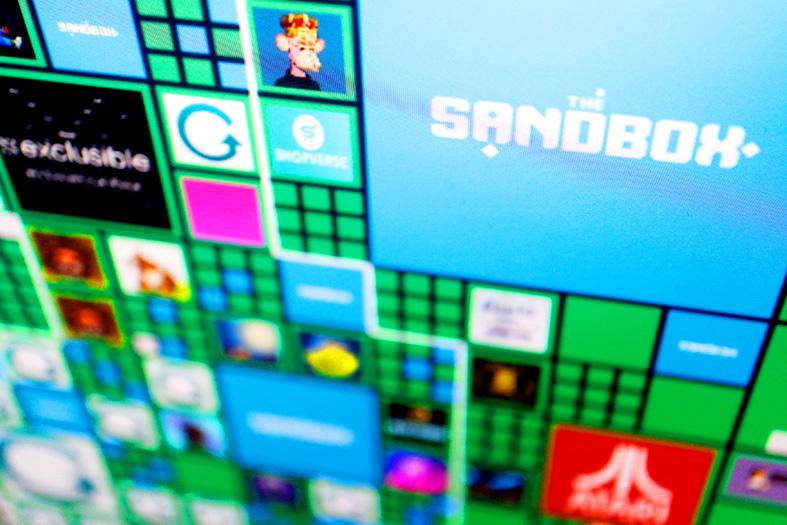Gaming companies FlickPlay and The Sandbox yesterday announced a new partnership that would allow players to use a blockchain asset on both platforms, representing a key step in the building of the metaverse.
The metaverse involves people moving freely between virtual worlds on different platforms, and taking their virtual clothing and other belongings with them, a concept called interoperability.
Such an idea is many years away and would require collaboration between companies and metaverse developers, including Facebook owner Meta Platforms Inc, Microsoft Corp and Epic Games Inc.

Photo: Reuters
FlickPlay is an app where players can unlock digital collectibles by using an interactive map of their actual surroundings, and then use their smartphone’s camera to overlay the collectibles onto the real world and interact with the objects to make videos and other content.
The app yesterday announced its first collection of non-fungible tokens (NFTs) called Flicky, which are to feature designs of an anthropomorphic chameleon wearing different clothes.
A portion of people who acquire a Flicky would be able to use the NFT as their avatar on The Sandbox, a Web and mobile game where players can build a three-dimensional virtual world.
Initially, Flicky owners would unlock a version of the chameleon to use on The Sandbox, but soon they will be able to use the exact version of the digital asset that is stored on the blockchain in both games, FlickPlay founder and chief executive Pierina Merino said, adding that the company is working with The Sandbox to reach interoperability by the end of this year.
The integration is notable because it might be the first to bridge an NFT in the virtual world with usage linked to the physical world, The Sandbox cofounder Sebastien Borget said.
The partnership with FlickPlay would help “create a more immersive experience that extends into the metaverse and The Sandbox,” Borget said.

In Italy’s storied gold-making hubs, jewelers are reworking their designs to trim gold content as they race to blunt the effect of record prices and appeal to shoppers watching their budgets. Gold prices hit a record high on Thursday, surging near US$5,600 an ounce, more than double a year ago as geopolitical concerns and jitters over trade pushed investors toward the safe-haven asset. The rally is putting undue pressure on small artisans as they face mounting demands from customers, including international brands, to produce cheaper items, from signature pieces to wedding rings, according to interviews with four independent jewelers in Italy’s main

Macronix International Co (旺宏), the world’s biggest NOR flash memory supplier, yesterday said it would spend NT$22 billion (US$699.1 million) on capacity expansion this year to increase its production of mid-to-low-density memory chips as the world’s major memorychip suppliers are phasing out the market. The company said its planned capital expenditures are about 11 times higher than the NT$1.8 billion it spent on new facilities and equipment last year. A majority of this year’s outlay would be allocated to step up capacity of multi-level cell (MLC) NAND flash memory chips, which are used in embedded multimedia cards (eMMC), a managed

Japanese Prime Minister Sanae Takaichi has talked up the benefits of a weaker yen in a campaign speech, adopting a tone at odds with her finance ministry, which has refused to rule out any options to counter excessive foreign exchange volatility. Takaichi later softened her stance, saying she did not have a preference for the yen’s direction. “People say the weak yen is bad right now, but for export industries, it’s a major opportunity,” Takaichi said on Saturday at a rally for Liberal Democratic Party candidate Daishiro Yamagiwa in Kanagawa Prefecture ahead of a snap election on Sunday. “Whether it’s selling food or

In the wake of strong global demand for AI applications, Taiwan’s export-oriented economy accelerated with the composite index of economic indicators flashing the first “red” light in December for one year, indicating the economy is in booming mode, the National Development Council (NDC) said yesterday. Moreover, the index of leading indicators, which gauges the potential state of the economy over the next six months, also moved higher in December amid growing optimism over the outlook, the NDC said. In December, the index of economic indicators rose one point from a month earlier to 38, at the lower end of the “red” light.